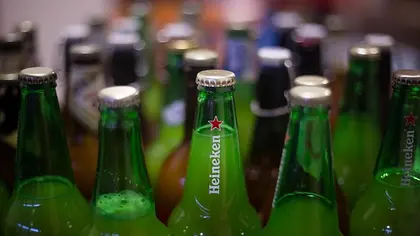A New York Times investigation said Russian President Vladimir Putin was able to capitalize on Western firm withdrawals by forcing them to sell assets at undesirable terms, often dictating the price and buyers – even outright nationalizing the firms if needed.
Russia’s invasion of Ukraine has triggered an exodus of Western companies that was intended to deprive Russia of foreign investment and products. However, many remained in Russia close to two years later, with some citing bureaucratic hurdles in completing the withdrawals.
JOIN US ON TELEGRAM
Follow our coverage of the war on the @Kyivpost_official.
The withdrawal, which cost Western firms more than $103 billion thus far, was described as “one of the biggest transfers of wealth within Russia since the fall of the Soviet Union” by the New York Times as the assets are now found within the hands of Russian elites and state-owned enterprises.
After numerous changes to the Russian legislation, all exit deals are now subject to government approvals and taxes upon exit.
The investigation cited Heineken, a major Dutch beer manufacturer, as an example. Despite reaching a deal with a Kazakh businessman, the Russian government rejected Heineken’s exit deal, and all 100 percent of its Russian shares were eventually sold to the Arnest Group, a Russian packaging firm, for a symbolic €1 with an expected total cumulative loss of €300 million for Heineken.
Meanwhile, those with the right government connections managed to capitalize on the Western exits.

Deadly Russian Missiles Contain Foreign Components - Zelensky
Armen Sarkisyan, a businessman with ties to the government, managed to absorb numerous Western assets in Russia during the exodus through his S8 Capital holding group, including Otis, a major elevator company that was sold to S8 in July 2022, as well as several international tire manufacturers’ assets in Russia.
OBI, a German hardware store chain, underwent multiple changes in ownership since its exit from Russia and is now listed under associates of the Russian politician Arsen Kanokov, an individual under Western sanctions.
Numerous companies, such as the Swedish furniture giant Ikea and automotive manufacturers like Nissan, Renault and Toyota, sold their Russian assets to state-owned groups, in turn financially contributing to Russia’s war in Ukraine.
The Russian government also outright seizes assets and places them under the control of Putin’s associates.
Carlsberg, a major beer company from Denmark, initially planned to sell its assets to the Arnest Group (who eventually acquired Heineken in Russia), but it was seized by the government and now placed under the control of Taimuraz Bolloev, Putin’s long-time associate and former president of Baltika, a major Russian beer manufacturer under Carlsberg.
Deputy Chairman of Russia’s Security Council Dmitri Medvedev taunted Carlsberg for the failed deal, noting that the transfer would directly contribute to Russia’s war efforts.
“A strong budget means help for the front,” he said. “In this regard, the senseless Danes also contribute to modern Russian weapons.”
With Russia increasing its federal budget for 2024 by 25 percent and generating oil export revenue that exceeded pre-war levels, many have questioned the effectiveness of Western sanctions in stopping Russia’s invasion of Ukraine,
However, as a recent Kyiv Post analysis shows, while the results are visible, experts said expectations were “inflated” and there needs to be increased effort to enforce the sanctions to achieve optimal effects.
You can also highlight the text and press Ctrl + Enter










